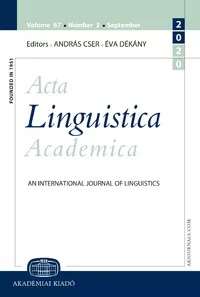Smaller syntax for English stative passives: A first report
Smaller syntax for English stative passives: A first report
Author(s): David EmbickSubject(s): Syntax
Published by: Akadémiai Kiadó
Keywords: word formation; syntax vs. lexicon; stative passive; Roots; complex head
Summary/Abstract: One of the basic questions in the theory of morphology concerns the nature of word formation: how morphemes are assembled into larger objects, and—crucially—whether there are distinct systems in which this occurs (lexicon versus syntax), or just one. Stative (a.k.a. “adjectival”) passives like opened in the opened door, or flattened in the metal is flattened, have provided an interesting testing ground for questions of this type. Following a period in which such passives were argued to be formed lexically, much subsequent work has developed the idea that they are derived syntactically, in fully phrasal structures. This paper examines a number of properties of English stative passives which raise problems for a fully phrasal treatment. These include (but are not limited to) (i) modification asymmetries relative to eventive passives; and (ii) interactions with un-prefixation. The generalizations that are revealed suggest that stative passives are built syntactically, but without phrasal internal structure: what I call small(er) syntax. Importantly, small structures are not tantamount to a lexical analysis; I provide a direct comparison that argues that the evidence favors the smaller type of approach. The argument for small structures has implications for the syntax of Roots that are introduced throughout the discussion.
- Issue Year: 70/2023
- Issue No: 3
- Page Range: 285-316
- Page Count: 32
- Language: English
- Content File-PDF

